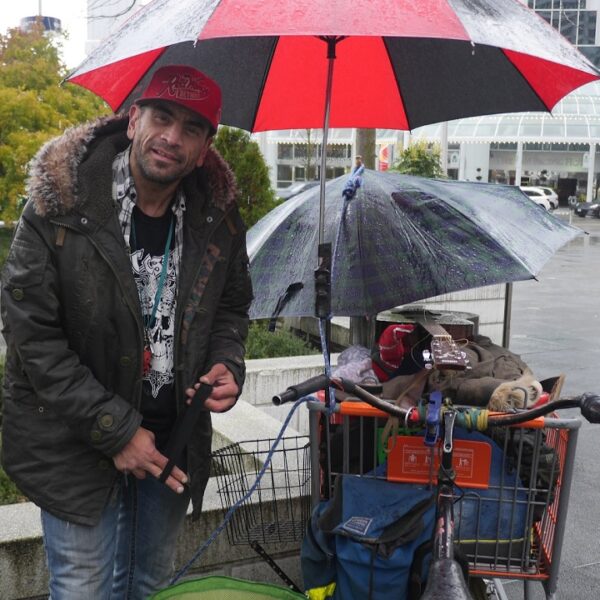There is an issue affecting the unhoused and underhoused population in Vancouver, British Columbia. A newly introduced mandatory fee on single-use cups and bags came into effect on January 1, 2022. The new bylaw bans plastic bags and requires businesses to charge a minimum of $0.15 for a paper bag and $0.25 for a disposable cup.
It is designed to reduce waste and promote sustainability. However, this by-law is not well thought out as it causes a nuisance at drive-through windows and many shops do not accept reusable cups due to COVID-19. There are many flaws in this plan. However, one flaw in particular is very troubling.
Officials implemented this bylaw during a global pandemic when the costs of food and related goods are experiencing extremely high inflation rates. Vancouver is the most expensive city in Canada and often considered one of the most expensive cities to live in globally.
Nonetheless, 25 cents perhaps is not much for the average consumer. For those experiencing homelessness, this fee could be the difference between having a drink and temporary shelter from the elements. Considering the extreme weather including flooding rain this city is experiencing, access to indoor space is necessary. Shelters are operating at 50% and are constantly at capacity. Warming centers provide respite but are temporary. Where should homeless people go?
Even before this bylaw, business owners did not often welcome the homeless folks of Vancouver into their coffee shops.
This past summer, I witnessed this in a small local coffee shop in Vancouver’s Gastown. It’s an upscale neighborhood that borders Vancouver’s infamous Downtown Eastside where there are disproportionally high levels of homelessness and poverty.
I slipped into a café shop for some warmth and cover from another cold and wet night. Only one other patron sat inside who presented as homeless. He sat quietly sipping his coffee. Though sitting completely upright, he seemed to doze off between sips and removed his shoes.
Sure, this is not appropriate, yet he wasn’t causing a disturbance. Rather than requesting he put his shoes back on, two security officers who patrol the neighbourhood were called and demanded he leave. Note, the coffee at a place like this runs at minimum $3.00 before tax. This man was a paying customer.
That must be irrelevant when you are homeless. The man was not bothering me or the only other customer present, nor was he causing any havoc. Security explained that if he did not leave on his own, they would remove him.
Out he went into the dark torrential downpour.
This is only one instance among several where Vancouver’s homeless people, despite being courteous and/or paying customers, have been asked to leave the few moments of solace they find at local cafes and shops.
When homeless people now attempt to purchase a coffee, they are berated for not having the additional $0.25. (Note: tax is charged on the $0.25 fee, rounding it up to $0.30.) I have seen this at a local Starbucks. The patron was also attempting to reuse the same disposable cup he paid for earlier and was denied.
Interactions such as these have become quite an issue at a local McDonalds. In an arrangement with a local organization, coupons for a breakfast sandwich and a coffee are distributed to those in need. However, since introducing this fee, many homeless folks don’t have the extra change and are denied the meal.
Additionally, many low-income folks count on their McCafé Rewards Program. A sticker is available on each disposable cup, easily amounting to a free medium McCafé beverage after seven purchases (including a $1.00 coffee).
Because purchase is necessary to sit inside and be sheltered, demanding a miniscule fee that the company profits from is abysmal. That’s right. The City’s website states:
“Food vendors keep fees from cups. Revenue from cup fees is not remitted to the City.”
Vendors are “encouraged” to use the fees toward reusable alternatives and related costs. But this is not a requirement. Large corporations such as McDonalds or Starbucks now make at minimum $0.25 more per customer for the exact same product.
How is increasing the profits of some of the most profitable discretionary brands helping the environment?
Recently, City Council has agreed to review the bylaw. While they will not repeal it, the council will examine how it affects vulnerable populations like homeless people. They will also review how it is implemented during a global pandemic, and loopholes such as cafes circumventing the bylaw by reducing their prices by $0.25 in order to keep customers.
Amidst this chaos, it is interesting that the unhoused and underhoused populations regularly practice sustainability. Many folks walk to their destination, take transit, utilize secondhand clothing, put a sweater on rather than turn up the heat, and so forth. And while it may make sense to charge an environmental fee of sorts, it is not a black and white solution. An initiative essentially designed to protect the planet and its people is perhaps doing more harm than good.













